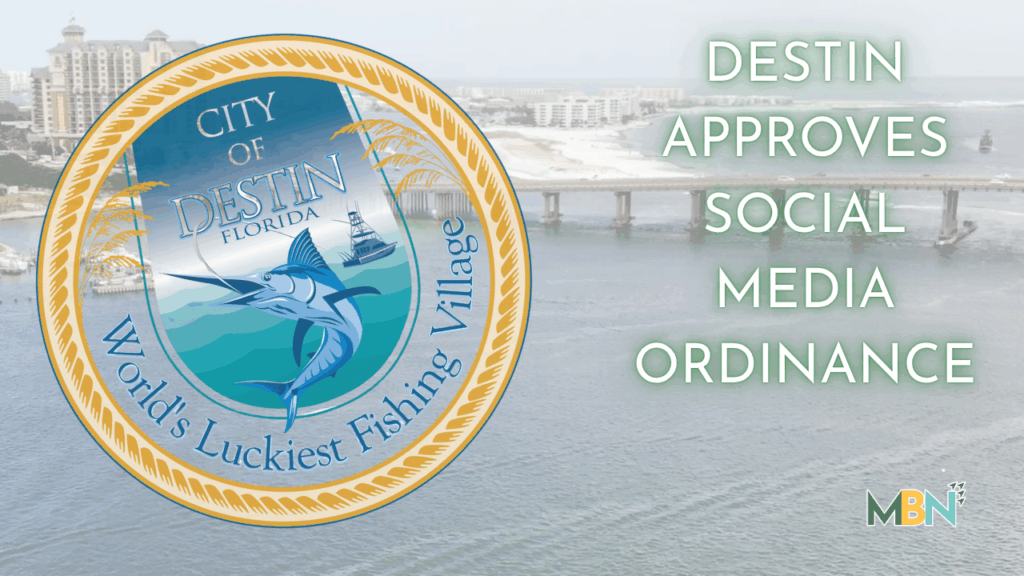
🛑 City officials are now banned from discussing city business on social media to avoid violating Florida’s Sunshine Law.
🗣️ Mayor Bobby Wagner and Councilmember Kevin Schmidt criticized the policy, citing concerns over free speech and transparency.
📱 The resolution covers even personal accounts and devices, warning officials their posts could be considered public records.
DESTIN — The Destin City Council voted 6–1 on Aug. 4 to adopt a new social media policy that prohibits elected officials and appointed board members from discussing city business online, a move aimed at preventing violations of Florida’s Government-in-the-Sunshine Law but one that drew sharp criticism from Mayor Bobby Wagner and Councilmember Kevin Schmidt.
Under Resolution 25-15, council members and board appointees are barred from engaging in online discussions about matters that may foreseeably come before them for a vote. The policy also discourages commentary on quasi-judicial issues and emphasizes that city-related posts on personal devices or accounts are subject to Florida’s public records laws.
While Wagner, who cannot vote unless there is a tie, signed the resolution as required, he stated he would not follow the policy unless it is enacted with enforceable penalties.
“Until there’s any repercussions, I am going to continue to have my freedom of speech,” Wagner said. “Bring an ordinance with real consequences — then we can talk enforcement.”
Schmidt cast the only dissenting vote, arguing that the policy limits transparency and communication.
“This policy handcuffs us,” Schmidt said. “More awareness and engagement happens on social media within Destin’s jurisdiction than in this room. We’re hurting ourselves by not being able to share our thoughts, passions and ideas.”
The resolution passed after a substitute motion by Schmidt to delay the vote and gather more examples of policies from other municipalities failed in a 5–2 vote.
City Attorney Kimberly Kopp defended the resolution, warning council members that social media posts about city business could unintentionally violate state law, even if officials act in good faith.
“Once something is posted, nobody else can respond in any way — or it’s a Sunshine Law violation,” Kopp said. “There’s been no exception created for social media yet.”
Kopp added that inadvertent “likes” or replies could be seen as civil violations, while knowing engagement could lead to more serious repercussions.
“Some things are inadvertent… That’s a civil problem. Then you’ve got the knowing violations. Somebody responds knowingly. That’s a criminal problem,” Kopp added.
Councilmembers Teresa Hebert and Sandy Trammell supported the policy, pointing to recent ethics training and the growing legal risks associated with digital platforms.
“People look at you as a representative of the city,” Hebert said. “Even if it’s your personal Facebook page, it’s never just personal.”
“It is really scary what can happen inadvertently,” Trammell added.
Councilman Jim Bagby noted that social media discussions lack the public notice required under the Sunshine Law.
“The wonderful or awful thing about social media is there’s no notice. It’s spontaneous. That’s the problem,” Bagby added.
Resolution 25-15 cites Attorney General opinions 2008-07 and 2009-19, which affirm that elected officials’ online posts related to city business are subject to both the Sunshine Law and Florida’s public records requirements.
The resolution requires officials to route all public communications through the city’s Public Information Officer.
“Even if you use your phone or Facebook page, if it’s city-related, it becomes a public record,” Kopp said.
Councilman Rodney Braden supported the resolution but warned against social media engagement that could invite public scrutiny or legal consequences.
We just got to be careful,” Braden said. “We don’t want to wind up on Fox News or CNN… breaking Sunshine Laws.”
Councilman Torey Geile, who said he has no social media accounts, offered a blunt critique of digital discourse.
“Maybe if we didn’t have social media, there’d be people in this damn audience and come up and use the three minutes instead of crying online all day about stuff that they aren’t invested in,” Geile said. “I think it’s a coward’s way to voice an opinion.”
Wagner and Schmidt countered that social media allows citizens to feel engaged and informed, even if they don’t attend meetings in person.
“They feel like they’re part of the team,” Wagner said. “Even if they’re just watching from the bench, they feel informed.”
Though the resolution is now in effect, it carries no formal penalties. Kopp noted that the council would need to pass an ordinance if it wishes to make the policy enforceable.
Wagner agreed, urging his colleagues to pursue formal legislation if they want to limit council members’ online speech.
“If you feel it’s this important,” Wagner said, “then let’s make it real.”
Register or login with Mid Bay News and never get another pop up on our site!